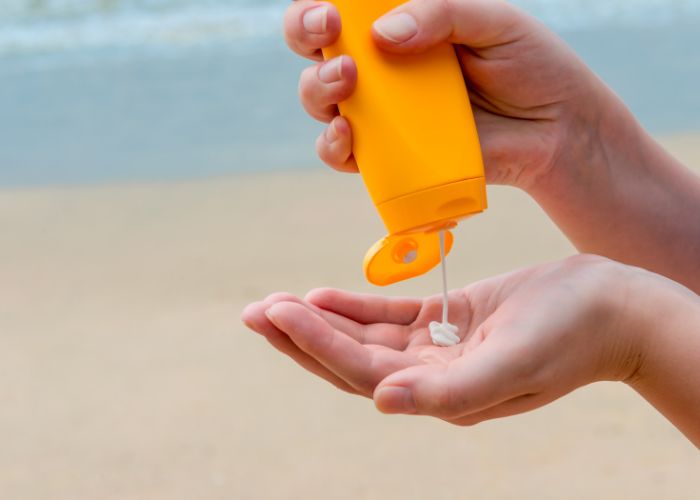The environmental movement ‘Ecologistas en Acción‘ has awarded 48 black flags to Spanish beaches that beaches that stood out negatively due to pollution and poor coastal management.
The analysis of the beaches began in 2005. However, in 2022 a beach will receive the first black flag for sunscreen pollution. The NGO presented the seventeenth ‘Black Flags’ report in Vigo (Pontevedra) on Tuesday. The report analysed 8,000 kilometres of Spanish coastline and awarded each of the coastal provinces a flag for pollution and another for poor environmental management.
Five black flags were awarded for effects on biodiversity, three for coastal erosion, three for the accumulation of marine litter, four for unjustified dredging and port extensions; four for effects due to the development of industrial areas close to the coast and ten for urbanisation of the coast.
In addition, 14 black flags were awarded for dumping, deficiencies in sanitation systems and serious sewage treatment problems. And another four for other reasons such as chemical pollution.
Furthermore, for the first time, a black flag was raised in the report for the effect of sun creams. Moreover, chemical sunscreens are a major polluter.
Sunburn kills nature in Nerja
In particular, the report cites the example of Nerja (Málaga). Here, the combination of overcrowding from tourism and the specific characteristics of the coves in the Paraje Natural Acantilados Maro-Cerro Gordo is causing sunburn pollution. The beaches here are semi-enclosed and, therefore, there is little movement of water. Furthermore, chemical sun creams can contain substances such as endocrine disruptors. These not only affect human health, but also that of seas, rivers and lakes. Therefore, they pose a significant threat to protected biodiversity.
Awareness of the state of terrestrial, coastal and marine ecosystems is increasing. However, governments remain “deaf” and “so slow” to act. Therefore, changes are “barely perceptible”, the NGO states.
Freedom from the black flag
The black flag has been withdrawn from two beaches because the situation has improved. In the case of Barbate (Cadiz) this is as a result of the new treatment plant. And in Roquetas de Mar (Almería) by the repair of the outfall and the extension of the treatment plant with tertiary treatment and the use of regenerated water. Another positive point is that, under pressure from society, political, administrative and judicial initiatives have been taken in the Mar Menor (Murcia). There,however, the black flag has not been removed. But the environmental organisation emphasises that, as a result of social pressure, some improvements are being observed. Although in the Mar Menor ‘much remains to be done’.
The ‘Black Flags 2022’ report is a tool making visible ‘flagrant cases’ of pollution and environmental mismanagement on the coasts. This is so that all governments become aware of these problems. And, furthermore, take immediate action to improve the health of our ecosystems, our economies and the people themselves.
48 black flags
In Andalucia, the black flags went to the following beaches
- Cuevas de Almanzora (Almería)
- Costa de Levante de Adra (Almería)
- Vejer and Barbate (Cadiz)
- La Rábita (Granada)
- La Charca (Granada)
- Ría de Huelva (Huelva)
- Playa de La Antilla (Huelva)
- Paraje Natural Acantilados Maro-Cerro Gordo (Málaga)
- Litoral de la provincia de Málaga (Málaga).
In Asturias, the black flag was awarded to;
- the industrial drainage of the Ría de Avilés and the regasification station of Gijón
- the drainage of the Bajo Asón and the caravan parks on the Cantabrian coast.
In Catalonia;
- at the port and airport of Barcelona
- the Abarlofarras in bays on the Costa Brava and Pineda d’en Gori (Gerona)
- at the beaches of Tarragona and Platja del Trabucador (Sant Carles de la Ràpita), in Tarragona
Ceuta also received black flags
These have been awarded to the coastline in front of the desalination plant and the northern bay of the city and to the LICES6310002 of Monte Hacho.
In the Basque Country, black flags were awarded to;
- Ría de Barbandun
- Muskiz and Gernica and Murueta in the Urdaibai Biosphere Reserve in Vizcaya
- San Sebastián and the port of Mutriku in Guipúzcoa
And in Galicia, the flags went to the;
- San Finx mines (Lousame)
- dredging of the O’Burgo estuary in La Coruña
- beach of Arealonga (San Cosme de Barreiros)
- island of Pancha (Ribadeo) in Lugo
- Foz estuary
- beaches of Vigo, in Pontevedra.
In the Balearic Islands
Porto Colom and Puerto de Alcudia, in Mallorca received the black flag. Whereas, in the Canary Islands the beaches Charco de la Araña (Los Silos) in Tenerife and Piscifactorías del Atlántico (Yaiza) and Waikiki Beach (La Goleta) in Las Palmas.
The autonomous city of Melilla
The black flag went to the dumping of waste in the city’s waterways and the project to redevelop the Primo de Rivera barracks.
The black flags for the Valencian Community were awarded to the
- bays of Cala de Lanuza and Cala Baeza
- ‘Colossus’ project in Calp in Alicante
- Playa de Les Fonts and Playa del Triador (Vinaròs) in Castellón
- sewage treatment plant of Pinedo
- dunes on Tavernes beach in Valencia
In the Murcia region
Here, the black flag went to Bahía de Portman.


